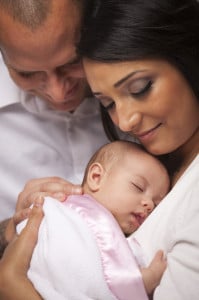
24 Oct 2013 New Egg Donation Study Offers Good News for Intended Parents
More and more women are becoming moms via egg donation over the past decade, with significantly improved outcomes, as reported at the annual meeting of the American Society for Reproductive Medicine’s annual meeting in Boston, which I attended last week.
As I discussed in a post last year, egg donation has historically often been considered a course of last resort, due to the fact that many intended parents want a child who is genetically related to them. But as the age at which women are having children has steadily risen in recent years, the number of women using donated eggs has also. According to a recent study by Emory University and the federal Centers for Disease Control and Prevention, published online in the Journal of the American Medical Association, U.S. fertility clinics reported 18,306 procedures using fresh or frozen donated eggs in 2010, up from 10,801 in 2000, USA Today reports. The 433 clinics from which data was collected represent 93% of U.S. fertility clinics.
The best news is that improved technologies and growing numbers of experienced fertility physicians have improved women’s odds of having an “ideal” birth, according to a report in Nature World News:
The ideal result, characterized as a single baby born on time and at a healthy weight, rose from 19 percent to 25 percent during this 10-year period. A total of 56 percent resulted in a live birth in 2010, most of whom were healthy.
Another positive result seen with the higher numbers of donated eggs was that fewer women were implanted with multiple embryos, which increases risk of complications, USA Today reported:
Since risks increase with multiple fetuses, the reproductive medicine society recommends that patients and doctors use no more than two embryos and consider using a single embryo when the donor is under age 35. In 2000, single embryos were used less than 1% of the time; in 2010, they were used in 14.5% of cases, the study found.
The average age of egg donors held steady at 28 from 2000 to 2010, as did the average age of egg recipients at 41.
Even with the improved outcomes resulting from egg donation, 89% of women who underwent in vitro fertilization, or IVF, in 2010 used their own eggs fertilized with sperm from their partner or from a donor. But the improved results from egg donation is great news for infertile women; for gay men who want to become fathers via egg donation and surrogacy, as Tommy and I did; and for intended parents who have delayed starting their families for any number of reasons. This rapidly evolving technology continues to offer more and more safe, effective options for family formation—results we can all celebrate.

















